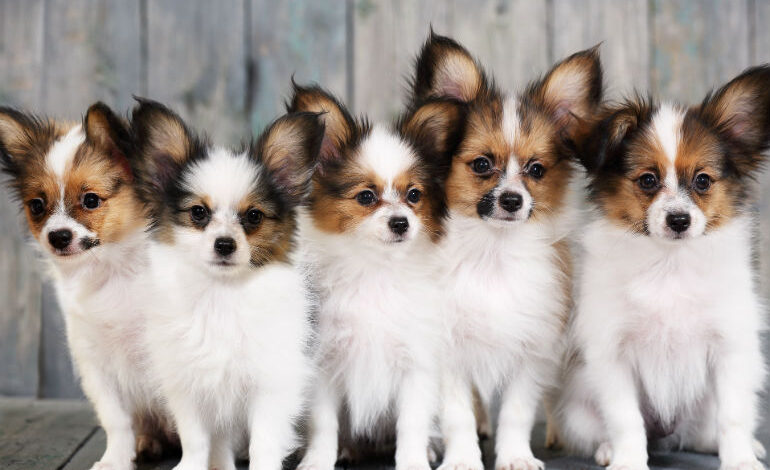All About the Papillon Dog: A Charming Companion

When it comes to small dog breeds, the Papillon dog stands out with its lively personality and stunning looks. With its butterfly-like ears, this breed has captured the hearts of dog lovers around the world. In this article, we’ll dive deep into the fascinating world of Papillons, exploring their history, characteristics, care needs, and much more. Whether you’re considering bringing a Papillon into your home or simply want to learn more about this delightful breed, you’re in the right place!
The History of the Papillon Dog
Understanding the background of the Papillon dog helps to appreciate its unique traits and characteristics. This breed has a rich history that dates back several centuries.
Origins in Europe
The Papillon is believed to have originated in Europe, particularly in France. Its name means “butterfly” in French, a nod to its distinctive ear shape. Papillons were popular among the nobility and often featured in portraits with their royal owners.
- Royal Companions: They were favored by European royalty, including Queen Marie Antoinette.
- Artistic Inspirations: Artists like Jean-Antoine Watteau depicted Papillons in their works, highlighting their charm.
Development of the Breed
Over the years, two distinct varieties of Papillons emerged: the Papillon and the Phalène. The main difference lies in the ears—Papillons have upright ears, while Phalènes have floppy ears.
- Recognition: The American Kennel Club (AKC) recognized the Papillon breed in 1935, solidifying its status as a beloved companion dog.
Physical Characteristics of the Papillon Dog
The Papillon dog is known for its striking appearance. Let’s explore the key physical traits that define this delightful breed.
Size and Build
Papillons are small dogs, typically weighing between 5 to 10 pounds. They stand about 8 to 11 inches tall at the shoulder. Their petite size makes them great companions for various living situations.
- Compact Frame: Their small, lightweight bodies allow for easy handling and travel.
- Graceful Movement: Papillons are known for their agile and graceful movements, reflecting their lively nature.
Distinctive Features
One of the most recognizable features of the Papillon is its ears. They are large, feathered, and resemble butterfly wings, giving the breed its name.
- Coloration: Papillons can come in various colors, including white, black, chocolate, and lemon. The contrast between their coat colors and ear markings is truly striking.
- Coat: Their long, flowing double coat requires regular grooming to keep it looking its best.
Temperament and Personality of the Papillon Dog
The Papillon dog is not just a pretty face; it also boasts a fantastic personality. Let’s explore what makes this breed so special.
Playful and Energetic
Papillons are known for their playful nature. They are energetic and require regular exercise to keep them happy and healthy.
- Playtime Enthusiasts: They love games like fetch and agility training.
- High Spirits: Papillons are often described as cheerful and spirited, bringing joy to their families.
Intelligent and Trainable
Another standout trait of the Papillon is its intelligence. They are quick learners and excel in obedience training.
- Eager to Please: This breed enjoys learning new tricks and commands.
- Competitions: Many Papillons participate in dog sports, such as agility and obedience competitions, showcasing their skills.
Affectionate Companions
Papillons thrive on human companionship and are known for their affectionate nature. They bond closely with their families and often seek attention and cuddles.
- Loyalty: Papillons are known to be loyal and devoted to their owners.
- Great Family Pets: They typically get along well with children and other pets, making them excellent family dogs.
Caring for Your Papillon Dog
Owning a Papillon dog comes with responsibilities. Here are essential tips to ensure your furry friend lives a happy and healthy life.
Nutrition
A balanced diet is crucial for your Papillon’s well-being. Here are some key points to consider:
- Quality Dog Food: Choose a high-quality dog food that meets your dog’s nutritional needs. Look for food labeled as “complete and balanced.”
- Portion Control: Pay attention to portion sizes to prevent obesity, as small breeds can gain weight easily.
Regular Exercise
Papillons may be small, but they are energetic dogs that need regular exercise.
- Daily Walks: Aim for at least 30 minutes of exercise each day, which can include walks, playtime, and mental stimulation.
- Interactive Toys: Providing toys that challenge their minds can help keep them engaged and entertained.
Grooming and Care
The long, flowing coat of the Papillon requires regular grooming to prevent matting and keep it clean.
- Brushing: Brush your Papillon coat several times a week to remove loose hair and prevent tangles.
- Bathing: Bathe your dog as needed, using a gentle dog shampoo to maintain coat health.
Veterinary Care
Routine veterinary visits are vital for your Papillon’s health.
- Regular Check-ups: Schedule annual check-ups to monitor your dog’s overall health.
- Vaccinations: Ensure your Papillon is up to date on vaccinations and preventative care.
Training Your Papillon Dog
Training is essential for any dog, and the Papillon dog is no exception. Here are some effective strategies for training your Papillon.
Positive Reinforcement
Using positive reinforcement techniques can make training fun for your Papillon.
- Treats and Praise: Reward your dog with treats and praise for good behavior.
- Short Sessions: Keep training sessions short and engaging to maintain your dog’s interest.
Socialization
Socializing your Papillon from a young age is crucial for developing a well-rounded personality.
- Exposure to Different Environments: Introduce your dog to various people, pets, and situations to build confidence.
- Puppy Classes: Consider enrolling your Papillon in puppy training classes for socialization and basic obedience training.
Basic Commands
Teaching basic commands is an important part of training.
- Sit, Stay, Come: Start with fundamental commands, as they are essential for your dog’s safety and behavior.
- Advanced Tricks: Once your Papillon masters the basics, challenge them with more advanced tricks.
Common Health Issues in Papillon Dogs
Like all breeds, the Papillon dog can be prone to specific health issues. Being aware of these conditions can help you keep your dog healthy.
Eye Problems
Papillons are prone to certain eye conditions due to their prominent eyes.
- Patellar Luxation: This condition occurs when the kneecap slips out of place, which can cause discomfort.
- Progressive Retinal Atrophy: A genetic disorder that can lead to vision loss over time.
Dental Health
Dental care is vital for Papillons, as small breeds are more susceptible to dental issues.
- Regular Cleanings: Schedule professional dental cleanings and brush your dog’s teeth regularly.
- Dental Chews: Provide dental chews to help maintain oral hygiene.
Regular Veterinary Visits
Routine veterinary check-ups can help detect health issues early.
- Vaccination and Preventative Care: Ensure your Papillon receives regular vaccinations and preventative treatments.
- Health Screenings: Discuss health screenings with your veterinarian, especially as your dog ages.
Why Choose a Papillon Dog?
Choosing the right dog for your lifestyle is essential, and the Papillon dog has many appealing qualities.
Small Size, Big Heart
Despite their small stature, Papillons have big personalities. Their cheerful and affectionate nature makes them wonderful companions.
- Adaptability: They thrive in various living situations, from apartments to houses with yards.
- Loyal Friends: Papillons form strong bonds with their families and are known for their loyalty.
Low Exercise Needs
While they are energetic, Papillons don’t require extensive exercise, making them suitable for busy individuals or families.
- Perfect for Apartments: Their small size allows them to live comfortably in smaller spaces.
- Daily Walks: A couple of short walks and playtime will keep them happy.
Lifelong Companionship
Papillons have a lifespan of around 12 to 16 years, meaning you’ll have a loyal friend by your side for many years.
- Lifelong Bond: They become integral parts of the family, providing love and joy throughout their lives.
Conclusion: The Joy of Having a Papillon Dog
In conclusion, the Papillon dog is a charming and delightful breed that brings joy to many families. Their unique appearance, energetic personality, and affectionate nature make them wonderful companions. By understanding their needs, providing proper care, and engaging in training, you can ensure that your Papillon leads a happy and healthy life.
Whether you’re considering adding a Papillon to your family or simply appreciating this breed’s beauty, it’s clear that they hold a special place in the hearts of dog lovers. With the right care and love, a Papillon dog can truly become a beloved member of your household, providing companionship and joy for many years to come.
